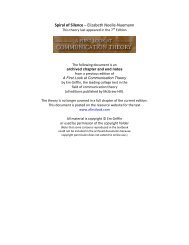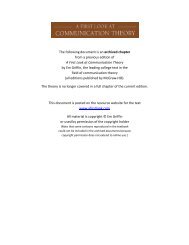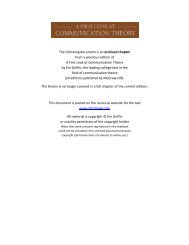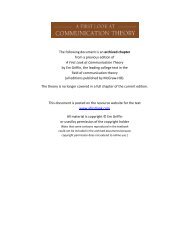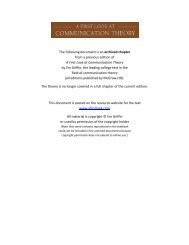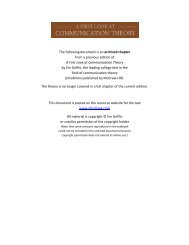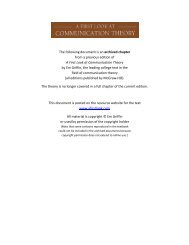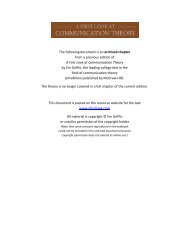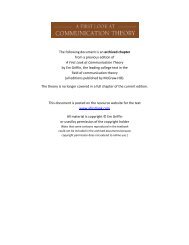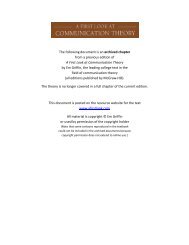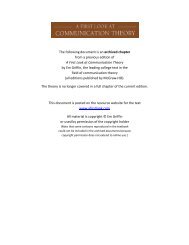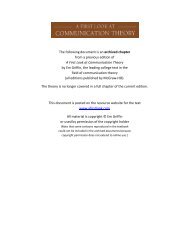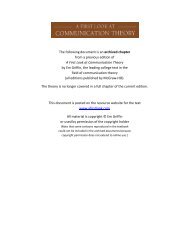Adaptive Structuration Theory of Marshall Scott Poole
Adaptive Structuration Theory of Marshall Scott Poole
Adaptive Structuration Theory of Marshall Scott Poole
You also want an ePaper? Increase the reach of your titles
YUMPU automatically turns print PDFs into web optimized ePapers that Google loves.
Interaction<br />
Intentional acts <strong>of</strong> group<br />
members who are aware<br />
<strong>of</strong> what they are doing.<br />
CHAPTER 18: ADAPTIVE STRUCTURATlON THEORY<br />
239<br />
that action doesn't always alter rules and resources. "If the structure <strong>of</strong> the group<br />
stays the same, it is because members are acting in such a way that the same<br />
structure is created and maintained with every act."l3 That seems to describe the<br />
entire two hours <strong>of</strong> the first class you attended.<br />
The next class is different. Right from the start, class members interact with<br />
each other on how to design the course. Even Pete wakes up to the realization<br />
that he has a stake in what's decided and voices a depth-over-breadth rationale<br />
for concentrating on fewer theories-perhaps only a dozen. Michelle piggybacks<br />
on his idea, suggesting that each student become an expert on a different theory.<br />
Andrew w elcomes the chance to specialize in one area-on the condition that he<br />
can pick a theory <strong>of</strong> new media that will intersect with his double major <strong>of</strong> communication<br />
and computer science. This surge <strong>of</strong> interaction supports <strong>Poole</strong>'s optimistic<br />
assumption that group members are "skilled and knowledgeable actors<br />
who reflexively monitor their activities as they navigate a continuous flow <strong>of</strong><br />
intentionality."14<br />
Skilled and knowledgeable actors don't always agree, however. Paige<br />
expresses concern that people will select only theories that are familiar or within<br />
their comfort zone. She thinks everyone should discuss theories that question<br />
unjust corporate control <strong>of</strong> the media and propose ways in which poor people<br />
could have a voice. Mike wants Pete to explain what he means by studying<br />
theory in depth. If he's referring to practical application, fine. If he means wading<br />
through primary sources, no way. Reminding the class <strong>of</strong> his special status as<br />
the pr<strong>of</strong>essor's TA, Josh claims that the pr<strong>of</strong> won't let the group concentrate on<br />
only a dozen theories while ignoring the other 20 that are in the book. Note that<br />
these class members raised issues <strong>of</strong> morality, communication, and power-issues<br />
that <strong>Poole</strong> and Giddens agree are fundamental in any social interaction. <strong>Poole</strong><br />
writes that these three elements are mixed together in every group action. He<br />
says that it's "hard to use moral norms without considering their interpretation-a<br />
matter <strong>of</strong> m eaning- and how they are 'made to count'-a matter <strong>of</strong><br />
power."lS<br />
Megan, always a sensitive observer <strong>of</strong> the human scene, notices that Lauren<br />
seems hesitant to speak. By specifically asking for her opinion, Megan tries to<br />
create a space for Lauren to be heard. In a s<strong>of</strong>t voice, Lauren wishes there could<br />
be a midrange compromise on the breadth/d epth issue. After class you overhear<br />
her thanking Megan for caring what she thinks. No doubt Megan's intentions<br />
were good, but in subsequent classes you observe that Lauren is even quieter.<br />
This confirms <strong>Poole</strong>'s structuration research, which suggests that advocacy can<br />
sometimes hurt rather than help a reticent member <strong>of</strong> the group.16 Megan's<br />
encouragement may simply reinforce Lauren's tendency to wait for an invitation<br />
before speaking up. Even actions that are well-thought-out have unanticipated<br />
consequences.<br />
The class experience I've described so far highlights two key points <strong>of</strong> adaptive<br />
structuration theory. First, communication in small task-groups makes a difference.<br />
We might know the structure <strong>of</strong> a group, the nature <strong>of</strong> its task, and even<br />
the history and personality <strong>of</strong> each member. But it is impossible to predict what<br />
decisions the group will make without hearing what's been said. Communication<br />
matters.<br />
Second, adaptive structuration theory has a "critical edge.,,17 Recall that<br />
critical theories strive to reveal unfair social practices and free people from<br />
oppressive systems (see Chapter 4). By highlighting the way in which undemocratic



